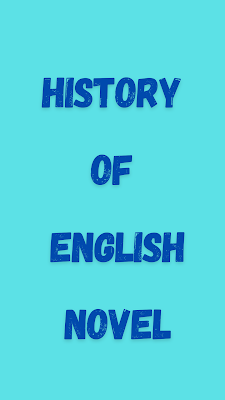Some important authors and their works:
| Author - Novelist | Work (Name of the Novel) | Speciality if any |
|---|---|---|
| Geoffrey Chaucer | The Canterbury Tales | |
| Lady Murasaki Shikibu | Tale of Genji | World's first novel |
| Miguel de Cervantes | Don Quixote | Spanish author |
| John Bunyan | The Pilgrim's Progress | |
| Aphra Behn | Oroonoko | |
| Daniel Defoe | Robinson Crusoe, Mall Flanders | |
| Jonathan Swift | Gulliver's Travels | A famous satire |
| Samuel Richardson | Pamela or Virtue Rewarded and Clarissa | Epistolary novels |
Major novelists of 18th century
Henry Fielding, Lawrence Sterne, Tobias Smollett, Charles Dickens, Walter Scott, Nathaniel Hawthorne, Horace Walpole, Thomas Hardy, Willkie Collins and H.G. Wells.
Major novelists of 20th century
E. M. Forster, James Joyce, Joseph Conrad, Henry James, George Orwell, Graham Greene, D. H. Lawrence, William Golding and Anthony Burgess
Immigrant authors:
Salman Rushdie (India), V. S. Naipaul (Trinidad). Kazuo Ishigura (Japan).
Some important female authors and their works:
| Author - Novelist | Work (Name of the Novel) | Speciality if any | Frances Burney | Evelina | novel of manners |
|---|---|---|
| Mary Shelley | Frankenstein | novel based on science of the age |
| Emily Bronte | Wuthering Heights | |
| Charlotte Bronte | Jane Eyre | |
| Mary Ann Evans alias George Eliot | wrote the novels reflecting psychological insight | |
| Virginia Woolf | pioneer of the Stream of Consciousness technique in English novel | |
| Agatha Christie | novels based on crime. Hercule Poirot and Miss Marple are famous characters created by her. |
Other Women novelists:
Jane Austen has been ruling over the minds of the people through her novels. Margaret Atwood, Toni Morrison and Alice Walker have elevated the tradition further to prosperity.
Indian Scenario:
‘Rajmohan's Wife', by Bankim Chandra Chattopadhyaya serialized in ‘The Indian Field’ was the first novel in English written by an Indian. .
The period after that is marked by few more novels written by the Indian writers. Mulkraj Anand, R. K. Narayan and Raja Rao were the major trio who prevailed in the period after that
Other Indian Novelists:
Anita Desai, Nayantara Sahgal and Arun Joshi, Manohar Malgonkar. Amitav Ghosh, Vikram Seth and Upamanyu Chatterjee.
Recent years novelists :
Salman Rushdie, Arvind Adiga, Arundhati Roy, Kiran Desai, Kiran Nagarkar
Novella
Novella, the word originated from the Italian word 'novelle', is a type of narrative prose fiction which is shorter than a full-length novel and longer than a short story.
6 Elements of Novel / Novella
| Elements of the Novel | Meaning | Features/Types if any |
|---|---|---|
| 1.Theme | the central idea, a philosophical statement. | |
| 2.Plot | story or the course of events, it is created by the conflict either internal (inside the mind of the character) or external (with other characters or entities) | simple (one plot) or complex (consisting the interweaving of many subplots). |
| 3.Character | Characterization is related to the plot as the course of events take place because of the certain behaviour of the characters. | Protagonist (main character – leading character - hero) is in conflict with a character or an entity or a force (internal or external) which is known as Antagonist – Villian |
| 4.Setting | background in which the story takes place. | includes place, period, time, climate or weather and lifestyle | 5.Conflict: | The struggle between the opposite forces in the story |
| 6.Language/Style | language and the techniques used by the author for the narration of the course of events |
Types of Novel:
Realistic novel:
gives the effect of realism and is also called a novel of manner
Picaresque novel:
The word ‘picaresque’ has originated from the Spanish word 'picaro', which means a rogue (eccentric and unruly).
Historical novel:
A historical novel is a novel set in a period earlier than that of the writing.
Epistolary novel:
The word 'epistolary’ derives from the Latin word ‘epistola’, which means a letter. The writer presents the narrative through a series of correspondence (letters/diary entries).
Gothic novel:
The novels that include terror, mystery, horror, thriller, supernatural, doom, death or decay or haunted buildings
Autobiographical novel:
: a novel based on the life of the author
Allegorical novel:
bears more than one level (layers) of meaning.
Utopian/ Dystopian novel:
Utopia is an imaginary community or society possessing the ideal qualities, whereas Dystopia is something completely opposite at Utopia
Psychological novel:
Deals with the internal life of the protagonist or even the other characters as much as the external factors.
Stream of Consciousness novel:
Stream of consciousness is a phrase coined by William James in his treatise 'Principles of Psychology' (1890). It means the flow of the thoughts.
'Bildungsroman' novel:
The German word ‘bildungsroman’ indicates growth, the growth of the protagonist's mind, spirit and characters from their childhood to adulthood.In the first half of the 20 century - 'pulp magazines’ become popular. It provided a building ground for the detective novels and science fiction
Science fiction
(second half of the 19th century) is a genre of speculative fiction dealing with imaginative concepts such as futuristic setting, futuristic science and technology, space travel, time travel, parallel universes and extraterrestrial life.
Detective fiction
is a subgenre of crime fiction and mystery fiction in which an investigator or a detective-either professional or amateur-investigates a crime, often a murder



0 Comments